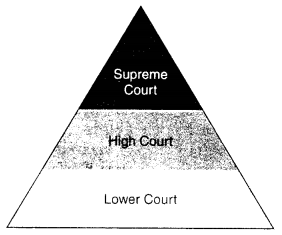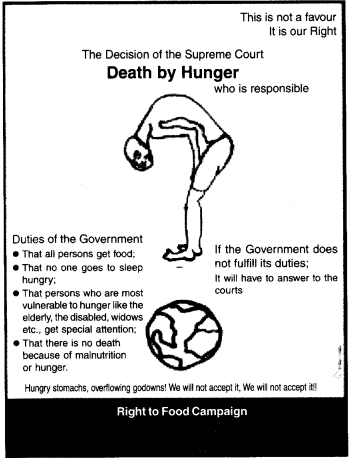NCERT Solutions for Class 8 Social Science Civics Chapter 5 Judiciary
These Solutions are part of NCERT Solutions for Class 8 Social Science. Here we have given. NCERT Solutions for Class 8 Social Science Civics Chapter 5 Judiciary
Question 1.
You read that one of the main functions of the judiciary is ‘upholding the law and Enforcing Fundamental Rights’. Why do you think an independent judiciary is necessary to carry out this important function?
Answer:
The independence of the judiciary allows the courts to play a central role in ‘upholding the law and Enforcing Fundamental Rights’ as it ensures that there is no misuse of power by the legislature and the executive. Anyone can approach the courts if they believe that their rights have been violated and Politicians or other socially powerful people cannot use their power to change any judgment.
Question 2.
Re-read the list of Fundamental Rights provided in Chapter 1. How do you think the Right to Constitutional Remedies connects to the idea of judicial review?
Answer:
Right to Constitutional Remedies declares that citizens can go to court for justice if they believe that any of their Fundamental Rights have been violated by the State. Hence the independence of the judiciary is necessary to uphold the rights of the citizens.
Question 3.
In the following illustration, fill in each tier with the judgments given by the various courts in the Sudha Goel case. Check responses with others in the class.
Answer:
- Lower Court: Laxman Kumar, Shakuntala and Subhash were sentenced to death.
- High Court: All the three were acquitted.
- Supreme Court: Sentenced Laxman and Shakuntala but acquitted Subhash due to lack of evidence.
Question 4.
Keeping the Sudha Goel case in mind, tick the sentences that are true and correct the ones that are False.
(a) The accused took the case to the High Court because they were unhappy with the decision of the Trial Court.
True. They went to the Supreme Court after the High Court had given its decision.
(b) They went to the High Court after the Supreme Court had given its decision, (c) If they do not like the Supreme Court verdict, the accused can go back again to the Trial Court.
False. They can’t go to High Court after the Supreme Court’s decision as the Supreme Court is the highest level Court of the country.
(c) If they do not like the Supreme Court verdict the accused cannot go back again to the Trial Court.
False. If they do not like the Supreme Court verdict the accused cannot go back again to the Trial Court.
Question 5.
Why do you think the introduction of Public Interest Litigation (PIL) in the 1980s is a significant step in ensuring access to justice for all?
Answer:
Access to courts has always been difficult for the vast majority of the poor in India. Legal procedures involve a lot of money and time. The poor who are illiterate and financially weak find it difficult going to court to get justice.
In the 1980s the Supreme Court devised a mechanism of Public Interest Litigation or PIL to increase access to justice for the poor and illiterate. Any individual or organisation can file a PIL in the High Court or the Supreme Court on behalf of those whose rights are being violated. It is not necessary, that the person filing a case should have a direct interest in the case.
Question 6.
Re-read excerpts from the judgment on the Olga Tellis vs Bombay Municipal Corporation case. Now write in your own words what the judges meant when they said that the Right to Livelihood was a part of the Right to Life.
Answer:
In the Olga Tellis vs Bombay Municipal Corporation case, the judges meant that the Right to Life had a wider meaning. It included the Right to Livelihood. Without means of livelihood, none can exist. By Livelihood one earns money to buy food, clothing, and shelter. Hence, none can be denied of his livelihood.
Question 7.
Write a story around the theme, ‘Justice delayed is justice denied’.
Answer:
Mohan was the only bread earner of his family. He was killed in an accident, leaving behind his widow and two daughters in 1980. His widow filed a case for compensation and a job on compassionate ground. The court lingered on the case for more than 28 years. She worked on the fields and her daughters worked as domestic help. With hard work, she was able to earn her livelihood. She borrowed money from the landlord and got her daughters married to poor grooms. The case was decided and compensation of ₹ 5 lakh was awarded to her. Now this money does not have any value for the widow. Justice has been delayed for 28 years. Hence, it is rightly said that justice delayed is justice denied.
Question 8.
Make sentences with each of the glossary words given?
Answer:
- Acquit: After a trial of 10 years in the Supreme Court, Mohan was acquitted of the charge of murdering his friend.
- To Appeal: I shall appeal in the higher court against the judgment of the lower court which is against me and from which I am not satisfied
- Compensation: 5 lakh was paid to Ruchi as compensation for her husband’s accidental death.
- Eviction: Eviction proceedings are pending in the court of the Rent Commissioner.
- Violation: Violation of the untouchability act is punishable under the Constitution.
Question 9.
The following is a poster made by the Right to Food campaign.
- Read this poster and list the duties of the government to uphold the Right to Food.
- How does the phrase “Hungry stomachs, overflowing godowns! We will not accept it!!” used in the poster relate to the photo essay on the Right to Food
Answer:
The duties of the government:
- To see that no one goes hungry.
- To provide food to all.
- To see that no one dies of hunger.
- To watch that everyone have balanced food.
This phrase relates to the photo essay on the Right to Food on page 65 because
- People in Rajasthan did not have sufficient food during drought.
- But the government godowns and those of Hoarders and Black-marketeers were full of grains.
- This situation was not acceptable to the people
The Judiciary NCERT Class 8 Social and Political life Extra Questions
Question 1
What do you understand by the word ‘law’?
Solution:
Law is a system of rules, usually imposed through a Government or Institution and is applied to govern a group people. It shapes politics, economics and society in numerous ways.
Question 2
What does judiciary mean?
Solution:
In law, the judiciary or judicial system is the system of courts which administers justice in the name of the state. It is the mechanism for the resolution of disputes and pronouncement of punishment. As an organ of the State, the judiciary plays a crucial role in the functioning of India’s democracy.
Question 3
How is the work of the judiciary categorized?
Solution:
The Judiciary comprises of courts that take decisions on a very large number of issues. The work of the judiciary can be divided into 3 categories, namely Dispute Resolution, Judicial Review and upholding the Law and Enforcing Fundamental Rights.
Question 4
Write a brief note on the independence of the judiciary.
Solution:
The Judiciary of India is an independent body. It is separate from the Executive and Legislative bodies of the Indian Government. The Executive and Legislature, that is the Central and State Governments, cannot interfere in the work of the judiciary.
The courts are not under the government and do not act on their behalf.
Judges in the High Court as well as the Supreme Court are appointed by the President with very little interference from the other branches of the government. It is also very difficult to remove a judge from his post.
Question 5
What is the structure of the judicial system of India?
Solution:
The judicial system of India is stratified into various levels. At the apex is the Supreme Court, which is followed by High Courts at the state level, District Courts at the district level and Lok Adalats at the Village and Panchayat Level.
The structure of the courts from the lower to the highest level resembles a pyramid.
Question 6
What is the ‘appellate system’?
Solution:
An appellate court, commonly called an appeals court or court of second instance is any court of law that is empowered to hear an appeal of a trial court or other lower tribunal. In most jurisdictions, the court system is divided into at least three levels: the trial court, which initially hears cases and reviews evidence and testimony to determine the facts of the case; at least one intermediate appellate court; and a supreme court which primarily reviews the decisions of the intermediate courts. A jurisdiction’s supreme court is that jurisdiction’s highest appellate court. Appellate courts nationwide can operate by varying rules.
The authority of appellate courts to review decisions of lower courts varies widely from one jurisdiction to another. In some places, the appellate court has limited powers of review. “Generally speaking, an appellate court’s judgment provides ‘the final directive of the appeals courts as to the matter appealed, setting out with specificity the court’s determination that the action appealed from should be affirmed, reversed, remanded or modified’”.
Question 7
Mention the branches of the Legal system.
Solution:
The Legal system can be divided into 2 branches, criminal law and civil law.
Question-8
What is “Public interest Litigation”?
Solution:
“Public interest Litigation” or PIL is a litigation filed in a court of law, for the protection of “Public Interest”, such as pollution, terrorism, road safety, constructional hazards etc.
PIL can be filed for the following reasons:
- Violation of basic human rights of the poor
- Content or conduct of government policy
- Compel municipal authorities to perform a public duty
- Violation of religious rights or other basic fundamental rights
- Any individual or organization can file a PIL in the High Court or the Supreme
- Court on behalf of those whose rights are being violated. It is not necessary, that the person filing a case should have a direct interest in the case.